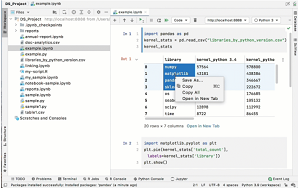News
Challenge to VS Code Python? JetBrains Tests Data Science IDE
In what might be seen as a challenge to the super-popular combination of Visual Studio Code and its Python extension, JetBrains is testing its own IDE for data scientists.
Called JetBrains DataSpell, the new offering has just emerged from a private Early Access Program and is now available to everyone wishing to join the EAP and do things like wrangle notebooks, made popular in the Jupyter scheme catering to AI and data science use cases.
 [Click on image for larger view.] JetBrains DataSpell in Animated Action (source: JetBrains).
[Click on image for larger view.] JetBrains DataSpell in Animated Action (source: JetBrains).
In fact, the primary focus during the preview testing was polishing the notebook experience, including the ability to smoothly manipulate Jupyter Notebook cells along with traditional shortcuts, crisp output display and quick-fixes, said JetBrains, which listed these improvements:
- We've made it possible to collapse individual outputs via both shortcut and mouse.
- We've significantly improved the scrolling of notebooks and notebook outputs.
- For table outputs, we've added dedicated actions to open data in separate editor tabs.
- For images, we've added dedicated actions to save images to a file.
- For unresolved packages in code cells, we've added a quick-fix that adds the import statement to the current cell and automatically invokes it so the user doesn't have to do so manually.
- Chinese and Korean characters are now properly displayed in table outputs.
JetBrains, of course, is known to the Visual Studio Magazine audience for its Rider .NET IDE and other tooling for Microsoft-centric development products like WinForms, Windows Presentation Foundation (WPF), ASP.NET and more.
Now the company appears to be mounting a challenge to VS Code and its Python extension, which bundles a Jupyter-specific tool. Both are extremely popular. VS Code has been named the No. 1 development tool in major surveys, and the Python extension available in the Visual Studio Code Marketplace has been downloaded a whopping 41.6 million times as of this writing. For perspective, the second-most popular tool in the marketplace is a C/C++ tool that clocks in at fewer than 23 million downloads.
JetBrains doesn't mention VS Code in its announcement, but it does answer a related question that has come up: "How is JetBrains DataSpell better than other tools for data scientists?"
Here's the answer:
When it comes to the Python ecosystem, there has never been an IDE designed specifically for data science. People involved in data science had to use either editors, developer IDEs, or standalone Jupyter notebooks. Only in the R ecosystem has a standalone IDE for data science actually been available. We've often heard people with RStudio experience complain that something similar doesn't exist for Python. JetBrains DataSpell is such an IDE for data scientists.
On one hand, JetBrains DataSpell brings a wide range of data science tools together, including notebooks, interactive REPL, dataset and visualization explorer, and Conda support. On the other hand, JetBrains DataSpell offers intelligent coding assistance for Python and tons of other tools, all integrated seamlessly under a unified user interface.
Additionally, even though Python support is a high priority, JetBrains DataSpell is open to support for other languages. Currently, it already has basic support for R. Support for other languages may be added later, too.
More about the new offering still in the EAP was shared in a video by Nafiul Islam, who noted it was created by the same people behind the company's Python-specific PyCharm IDE.
"The PyCharm team has been working on a new IDE called DataSpell, and what DataSpell does is that it answers the question of what are we doing for data scientists out there, right," he said. "So DataSpell is a new IDE that is designed for professional data scientists. At the core of that experience is Jupyter Notebooks. We've worked really hard to make that Jupyter Notebook experience as clean as possible."
Along with opening up the EAP to the public, JetBrains is sending invites to everybody who has been waiting for one and is also letting developers download EAP builds from the DataSpell web site without registration.
More information is also available in a much longer video titled "From Jupyter Notebooks To JetBrains DataSpell."
The Sept. 6 announcement also provides more details on expected pricing (similar to other JetBrains IntelliJ-based IDEs) and functionality and answers questions about how DataSpell differs from PyCharm. One interesting note about the latter: "Most of the functionality of JetBrains DataSpell, including the support for Jupyter notebooks, will soon also be available with PyCharm Pro."
About the Author
David Ramel is an editor and writer at Converge 360.